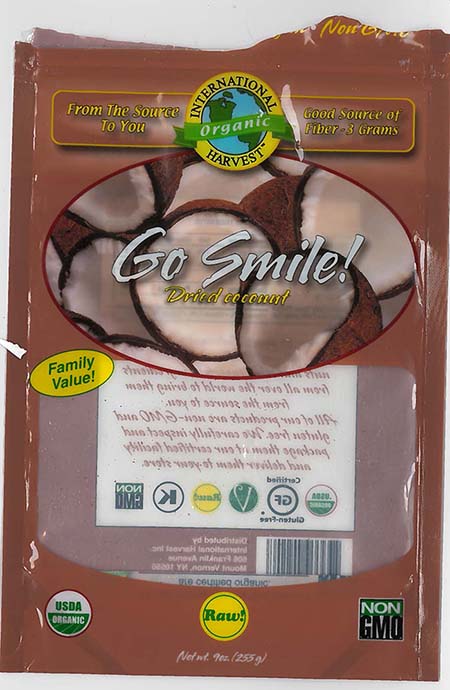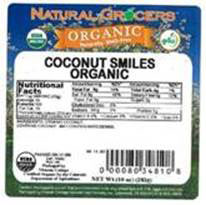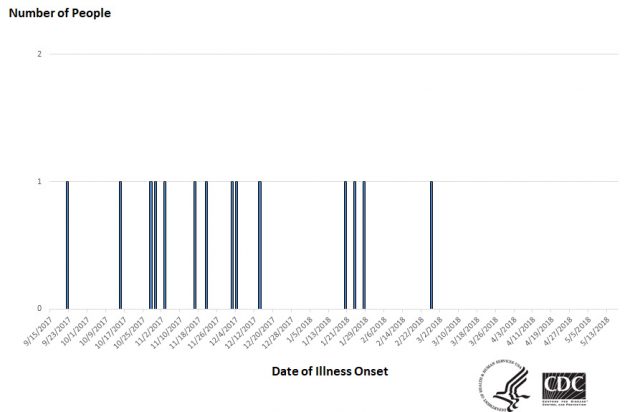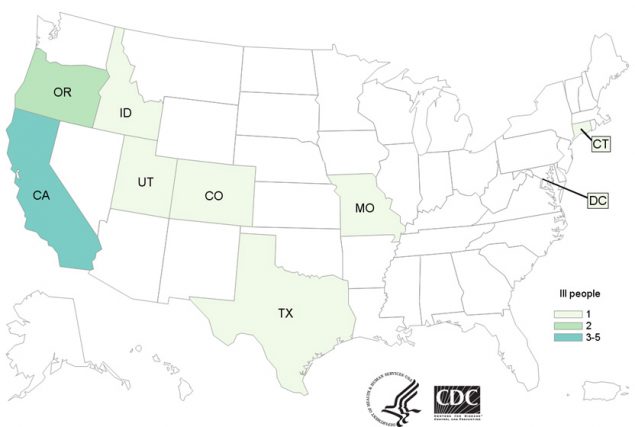2018 Salmonella Typhimurium Infections Linked to Dried Coconut (Final Update)
Posted May 18, 2018 4:00 PM ET
This outbreak appears to be over. However, recalled dried coconut products have a long shelf life and may still be in people’s homes. Consumers unaware of the recall could continue to eat these products and potentially get sick. Read the Recall and Advice to Consumers and Retailers.
- Read the Recall and Advice to Consumers and Retailers>>
- As of May 18, 2018, this outbreak appears to be over.
- Do not eat recalled dried coconut products. Retailers should not sell or serve recalled dried coconut products.
- These products have a long shelf life and may still be in people’s homes.
- Throw it away or return it to the place of purchase for a refund.
- Several grocery store and retail locations received recalled bulk packages of International Harvest, Inc. brand Go Smiles Dried Coconut Raw.
- The recalled bulk dried coconut may have been repackaged into clear, plastic containers with grocery store labeling, or served in bulk bins.
- The list of locations and cities where recalled bulk dried coconut was sold is available on the U.S. Food and Drug Administration (FDA) website.
- If you aren’t sure if your dried coconut was recalled, do not eat it and throw it away.
- CDC, public health and regulatory officials in several states, and the FDA investigated a multistate outbreak of Salmonella Typhimurium infections.
- Epidemiologic, laboratory, and traceback evidence indicated that dried coconut was the likely source of this multistate outbreak.
- Fourteen people infected with the outbreak strain of Salmonella Typhimurium were reported from eight states and the District of Columbia.
- Three ill people were hospitalized, and no deaths were reported.
Introduction
CDC, public health and regulatory officials in several states, and the U.S. Food and Drug Administration (FDA) investigated a multistate outbreak of Salmonella Typhimurium infections.
Public health investigators used the PulseNet system to identify illnesses that may have been part of this outbreak. Fourteen people infected with the outbreak strain of Salmonella Typhimurium were reported from eight states and the District of Columbia. A list of the states and the number of cases in each can be found on the Case Count Map page. Whole genome sequencing (WGS) performed on bacteria isolated from ill people showed that they were closely related genetically. This means that people in this outbreak were more likely to share a common source of infection.
Illnesses started on dates ranging from September 22, 2017 to February 26, 2018. Ill people ranged in age from 1 to 73 years, with a median age of 38. Among ill people, 62% were female. Three hospitalizations were reported. No deaths were reported.
WGS analysis did not identify antibiotic resistance in 12 of 13 isolates from ill people. One isolate contained resistance genes for ampicillin and azithromycin. Testing of outbreak isolates using standard antibiotic susceptibility testing methods by CDC’s National Antimicrobial Resistance Monitoring System (NARMS) laboratory revealed two isolates with no antibiotic resistance and one isolate with resistance to streptomycin.
Investigation of the Outbreak
Epidemiologic, laboratory, and traceback evidence indicated that dried coconut was the likely source of this multistate outbreak.
In interviews, ill people answered questions about the foods they ate and other exposures in the week before they became ill. Eight (80%) of ten people interviewed reported eating dried coconut from grocery stores. Of the eight people who reported eating dried coconut, four people purchased the product at different Natural Grocers store locations.
FDA and state health and regulatory officials collected leftover dried coconut from ill people’s homes, as well as dried coconut from Natural Grocers store locations where ill people shopped and from the Natural Grocers’ Distribution Center. FDA testing identified the outbreak strain of Salmonella Typhimurium in an unopened sample of Natural Grocers Coconut Smiles Organic collected from Natural Grocers. The outbreak strain was also identified in an opened, leftover sample of Natural Grocers Coconut Smiles Organic collected from an ill person’s home.
FDA also collected dried coconut from International Harvest, Inc. The outbreak strain of Salmonella Typhimurium was identified in samples of International Harvest Brand Organic Go Smile! Dried Coconut Raw and Go Smiles Dried Coconut Raw.
WGS results showed that the Salmonella from dried coconut was closely related genetically to the Salmonella from ill people. This result provided more evidence that people in this outbreak got sick from eating contaminated dried coconut.
On March 16, 2018, International Harvest, Inc. recalled bags of Organic Go Smile! Raw Coconut and bulk packages of Go Smiles Dried Coconut Raw. The recalled Organic Go Smile! Raw Coconut was sold online and in stores in 9-ounce bags with sell-by dates from January 1, 2018 through March 1, 2019. Recalled bulk Go Smiles Dried Coconut Raw was sold in a 25-pound case labeled with batch/lot numbers OCSM-0010, OCSM-0011, and OCSM-0014. These products were sold in various grocery stores. The list of locations and cities where recalled bulk dried coconut was sold is available on the FDA website.
On March 19, 2018, Vitamin Cottage Natural Food Markets, Inc. recalled packages of Natural Grocers Coconut Smiles Organic labeled with barcode 8034810 and packed-on numbers lower than 18-075. Recalled Natural Grocers Coconut Smiles Organic were sold in 10-ounce clear plastic bags with the Natural Grocers label. The packed-on number can be found in the bottom left-hand corner of the label.
People should not eat recalled International Harvest, Inc. brand Organic Go Smile! Raw Coconut, Go Smiles Dried Coconut Raw, or recalled Natural Grocers Coconut Smiles Organic products. Throw it away or return it to the place of purchase for a refund. Retailers should not sell or serve recalled dried coconut products.
As of May 18, 2018, this outbreak appears to be over.



